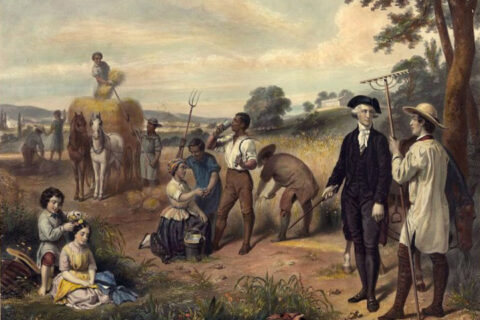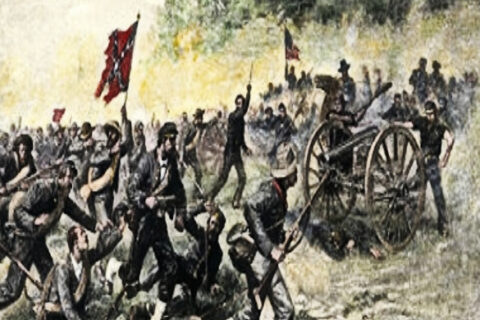A government of unlimited or undefined powers will eventually become totalitarian. This was widely known amongst Southerners. Thomas Jefferson believed that states’ rights were the best protection to preserve liberty and a republican form of government. John Taylor of Caroline warned, “If a government can take some, it may take all.” St. George Tucker taught, “Power when undefined, soon becomes unlimited.” In the first annals of Congress, James Jackson said, “We must confine ourselves to the powers described in the Constitution, and the moment we pass it, we take an arbitrary stride towards a despotic government.” James Roesch quotes John Randolph of Roanoke addressing Congress, “If they begin with declaring one law of one state unconstitutional, where were they to stop? They might go on until the state governments, stripped of all authority… a great consolidated empire established upon their ruins… in such a contest the states must fall, and when they did fall, there was an end of all republican government in the country.”
In other words, the only method to prevent an unlimited government is to counter all minor steps it takes beyond its authority. To do so, there must be a check from outside the government itself since it will not limit its own powers, only expand them. In our federated republic, this check was the state governments who were to maintain the Founders’ principles for their peoples. Future President John Adams, a Massachusetts federalist, agreed that arbitrary power could not be left unchecked;
“Nip the shoots of arbitrary power in the bud, is the only maxim which can ever preserve the liberties of any people. When the people give way, their deceivers, betrayers, and destroyers press upon them so fast, that there is no resisting afterward. The nature of the encroachment upon the American Constitution is such, as to grow every day more and more encroaching. Like a cancer, it eats faster and faster every hour. The revenue creates pensioners, and the pensioners urge for more revenue. The people grow less steady, spirited, and virtuous, the seekers more numerous and more corrupt, and every day increases the circles of their dependents and expectants, until virtue, integrity, public spirit, simplicity, and frugality, become the objects of ridicule and scorn, and vanity, luxury, foppery, selfishness, meanness, and downright venality swallow up the whole society. “
John Adams, Novanglus Letters, 1774
The claim that the Deep South left the Union to preserve slavery does not make sense; no one was trying to abolish slavery within those states. In his book, The Yankee Problem, Clyde Wilson quotes Horace Greeley at the 1860 Republican convention saying, “An anti-slavery man per se cannot be elected, but a tariff, river-and -harbor- Pacific Railroad, free homestead man, may succeed although he is anti-slavery.” Historian David Donald wrote, “No responsible political body in the North in 1860 proposed to do anything at all about slavery where it actually existed.” On Tuesday, March 5, 1861, the New York Times editorial (which celebrated Lincoln’s inaugural) said the president’s address was “explicit and emphatic in its guarantees to the alarming interest of the Southern states.” Lincoln “Disavowed all thought” of “interfering with slavery in any state where it exists.”
On September 23, 1862, the New York Times printed the preliminary Emancipation Proclamation with a headline that read, “the war still to be prosecuted for the restoration of the Union.” And in a letter to the federal minister in Paris, the Secretary of the State William Seward wrote, “The condition of slavery in the several States will remain just the same, whether it succeeds or fails. The rights of the States, and the condition of every human being in them, will remain subject to exactly the same laws and form of administration, whether the revolution shall succeed or whether it shall fail.” Union generals such as McClellan and McDowell returned fugitive slaves to their masters during the War.
Since slavery wasn’t being threatened where it existed in the Union, it would be hard to accept that Southerners would fight a war and leave the country just to have slavery extended into new territories. In fact, if slavery were extended, it would provide more competition to the Southern slave states’ monopoly on cotton. In 1843, many wealthy Southern planters and men, such as John Calhoun, voted against Texas joining the Union because they said it would reduce the price of cotton. Furthermore, the South forfeited federal protection for their runaway slaves under the fugitive slave laws by leaving the Union. They were also giving up their right to bring slaves into the territories of the United States.
If the South fought only to preserve slavery, with no regard for states’ rights, they could have remained in the Union. During the War, Lincoln told Southerners if they laid down arms, they could come back into the Union with slavery intact. Even the Emancipation Proclamation was an attempt to reconcile slave states back in the Union. John Cannan in The Peninsula Campaign writes, “The Emancipation Proclamation was actually an offer permitting the South to stop fighting and return to the Union by January 1 and still keep its slaves,” and the South understood it as such. In July 1863, a Raleigh newspaper stated, “Peace now would save slavery, while a continued war would obliterate the last vestiges of it.” Confederate Major General John Gordon wrote, “At any period of the war from its beginning to near its close, the South could have saved slavery by simply laying down its arms and returning to the Union” Yet, for other reasons mentioned, the South chose to continue the fight.
Slavery was permitted in the South, but that does not mean it was always celebrated. Today, we have legalized abortion, perhaps some view abortion as many Southerners viewed slavery, as a necessary evil.
Virginia freed more slaves before the Civil War than New York, New Jersey, Pennsylvania, and New England combined. South Carolinian Mary Chestnut said that slavery was a curse, yet she supported secession. She and others hoped the war would end with a “Great independent country with no slavery.” But for the typical Southerner, the issue over slavery was much more profound as it involved states’ rights and the nature of the Union.
“When the Government of the United States disregarded and attempted to trample upon the rights of the States, Georgia set its power at defiance and seceded from the Union rather than submit to the consolidation of all power in the hands of the Central or Federal Government.”
Joseph E. Brown, Georgia Governor, to Jefferson Davis over the Conscription act 1862
In antebellum America, the states resisted federal expansion in various ways. The first issue between central and state governments arose over the Alien and Sedition Acts. Later problems involved internal improvements, national banking, conscription, protective tariffs, land disputes, freedom of speech, free trade, state control of the militia, fugitive slave laws, etc. No matter the subject, states generally held firm and fought against federal expansions. The South was doing what states had done in antebellum America, resisting national expansion when it went past its constitutional bounds. The outcomes of the Republican victory have resulted in our current overbearing government, which has no regard for its ostensibly limited powers, proving the South correct.
“The South’s concept of republicanism had not changed in three-quarters of a century; the North’s had. With complete sincerity, the South fought to preserve its version of the republic of the Founding Fathers–a government of limited powers that protected the rights of property, including slave property, and whose constituency comprised an independent gentry and yeomanry of the white race undisturbed by large cities, heartless factories, restless free workers, and class conflict. The accession of the Republican party, with its ideology of competitive, egalitarian, free-labor capitalism, was a signal to the South that the Northern majority had turned irrevocably toward this frightening future.”
James M. McPherson, Antebellum Southern Exceptionalism: A New Look at an Old Question
South Carolina Secession Document
“The one great evil, from which all other evils have flowed, is the overthrow of the Constitution of the United States. The Government of the United States is no longer the government of confederated republics, but of a consolidated Democracy… the limitations in the Constitution have been swept away; and the Government of the United States has become consolidated, with a claim of limitless powers in its operations.”
Address of South Carolina to Slave-Holding States, Convention of South Carolina 1860
South Carolina was the first state to secede from the Union. If the state declaration of the causes of secession is read, in full, it gives an excellent example of slavery as a state’s rights issue. In the document, quoting from a resolution of the state convention of 1852, it was declared “That the frequent violations of the Constitution by the United States, by the Federal Government, and its encroachments upon the reserved rights of the States, fully justified this State in then withdrawing from the Federal Union.” At that time, they had refrained, but their situation had only worsened, and they could no longer remain. In their declaration of the causes of independence, the writers wanted it known that state rights were the true motivator of secession. That is why at first glance through the text, you will see “FREE AND INDEPENDENT STATES,” with minor variations in the phrasing, capitalized three times in the document.
The document goes into the history of states’ rights in America. It mentions the federal government’s failure to uphold the Constitution and the government’s interference with the rights of the states. South Carolina stated that if they were to stay in the Union, the “guaranties of the Constitution will then no longer exist; the equal rights of the States will be lost” and that the federal government would become its enemy. While slavery is mentioned six times, states’ rights, independent states, and state sovereignty are mentioned sixteen times. States’ rights are discussed without any connection to slavery, yet slavery is always mentioned in connection with states’ rights. Just as Southern Democrats had been saying for decades in their political party planks, an attack on slavery was an attack on states’ rights.
“For more than thirty years the people of South Carolina have been contending against the consolidation of the government of the United States… the United States Government has steadily usurped powers not granted- –progressively trenched upon States Rights.”
Charleston Mercury, South Carolina, April 20, 1861
Slavery in the Territories
“The struggle in our territories… has not been a struggle for the emancipation of slaves. It has been a contest for power… The Northern people, in attempting to preclude the Southern people, by the legislation of Congress… a party hostile both to the Constitution and the decisions of the Supreme Court, have been placed in control of the Government… Whether all the States composing the United States should be slaveholding or non-slaveholding States, neither the Northern nor Southern States ought to have permitted to be a question in the politics of the United States.”
-Report of the Committee on Foreign Affairs C.S.A, 1861
The fight over the expansion of slavery into the new Western territories was a political battle. Were the states coming into the Union allowed their state rights as all previous states had been, or was the federal government allowed to infringe on those rights and command them? Were states sovereign or subject to federal control? The South fought for these new states coming into the Union to be allowed to decide on their own about slavery regardless of the outcome.
Further, was the federal government allowed to command where slave owners were allowed to go within the Union? Could they prevent their migration to the Western territories, thus giving political control to the Republican Party? Were Southerners full citizens in their own country with the same rights as non-slave owners? Would the federal government be allowed to discriminate against any minority group that lacked the powers to defend themselves?
But the Southern objection was more than a fight for seats in Congress, as slavery was very unlikely to extend west. According to David Donald in Lincoln Reconsidered, “Slavery did not go into New Mexico or Arizona, Kansas, after having been opened to the peculiar institution for six years, had only two negro slaves.” To many Southerners, the fight was to maintain states’ authority in the Union and preserve the Constitution and people’s self-government.
“That when the settlers in a territory, having an adequate population, form a State Constitution, the right of sovereignty commences and being consummated by admission into the Union, they stand on an equal footing with the people of other States, and the State thus organized ought to be admitted into the Federal Union, whether its Constitution prohibits or recognizes the institution of slavery.”
Southern Democratic Party Platform, 1860

Jeb Smith is the author of four books, the most recent being Missing Monarchy: Correcting Misconceptions About The Middle Ages, Medieval Kingship, Democracy, And Liberty. Before that, he published The Road Goes Ever On and On: A New Perspective on J. R. R. Tolkien and Middle-earth and also authored Defending Dixie’s Land: What Every American Should Know About The South And The Civil War, written under the name Isaac C. Bishop. Smith has authored dozens of articles in various publications, including History is Now Magazine, The Postil Magazine, Medieval History, Medieval Magazine, and Fellowship & Fairydust and featured on various podcasts including The Lepanto Institute.






It’s good to know the in-depth reasons for secession. But in public debate it’s helpful to make the issue as simple as possible: Our ancestors seceded because they didn’t want to remain in a Union with people who despised them and threatened them with social, political, and economic harm.
The War and its aftermath more than confirmed their concerns: The weaponization of the black population against constitutional government 2) Imposition of the 14th Amendment in total disregard for the Constitution and states’ rights. 3) Economic strangulation which punished the South with poverty for nearly a century.
Today we remain in a Union with people who despise us and mean us harm.
Agreed, but the descendants of those people will say they are justified in hating the South.